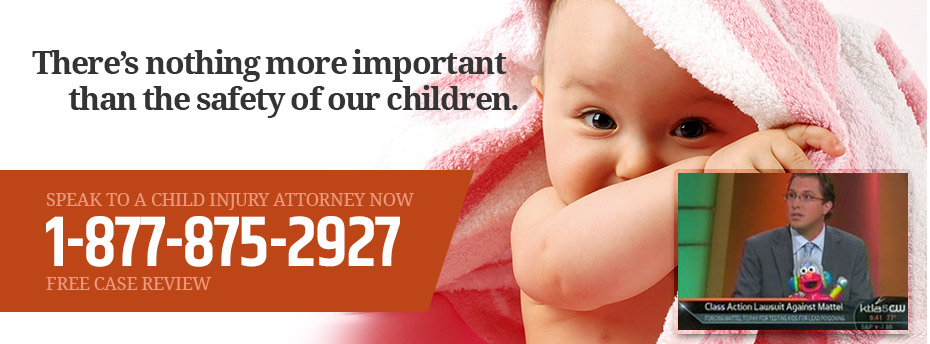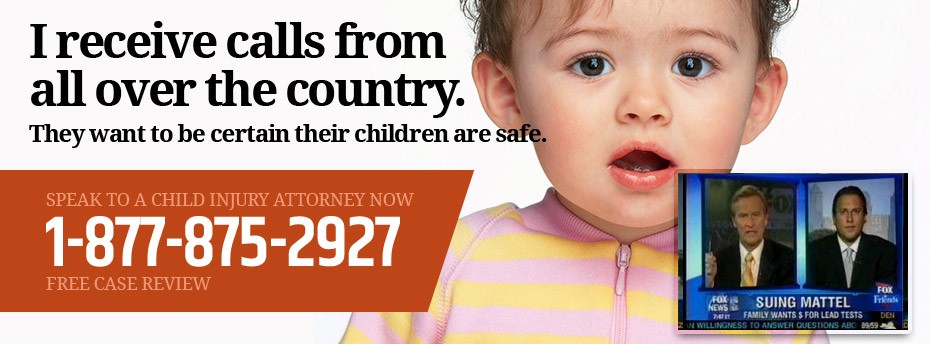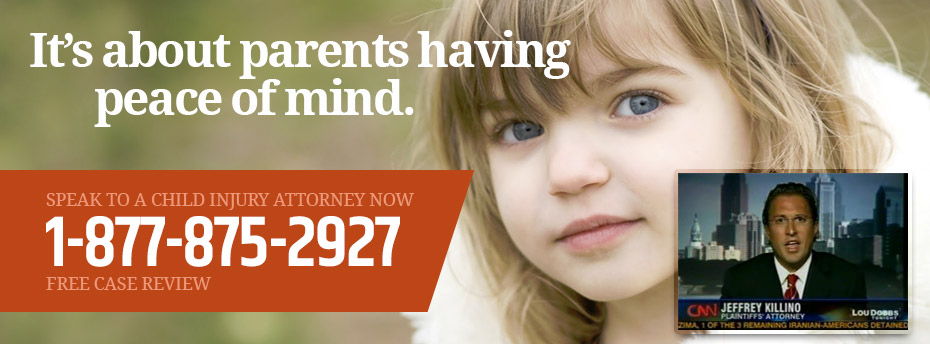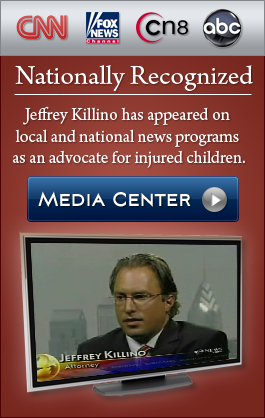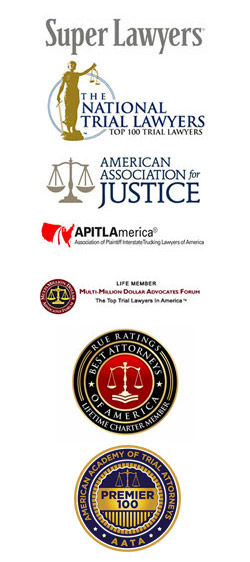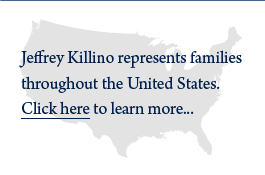Parents should be able to trust that the foods they purchase for infants and toddlers are safe and healthy. Unfortunately, two alarming reports recently raised concern that significant levels of toxic heavy metals in some popular baby food products could be putting kids at risk.
The Killino Firm’s highly experienced Child Poisoning Lawyers have extensive success representing children hurt by contaminated foods and other toxic products, earning national recognition for their aggressive pursuit of justice on behalf of injured victims and their families.
If your son or daughter suffered any health problems that you believe were the result of toxic baby food, please call our law firm toll-free at 877-875-2927 to speak with an attorney and learn more about your legal rights.
Heavy Metals in Baby Food: What Parents Need to Know
More than a year ago, Healthy Babies, Bright Futures published a report that struck fear into the hearts of parents everywhere. The consumer advocacy group’s analysis of more than 150 baby food products – including popular brands of formula, juice, rice cereal, fruits and vegetables, and snacks – revealed that more than 95% contained toxic heavy metals like arsenic, lead, cadmium, and mercury.
One of the most concerning problems uncovered by the study? Rice, a staple in many baby foods, including cereal and snacks, contained high levels of inorganic arsenic.
In February 2021, another report from the Subcommittee on Economic and Consumer Policy within the U.S. House Oversight and Reform Committee also found that many of the products made by the country’s largest commercial baby food manufacturers contain significant levels of lead, arsenic, cadmium, and mercury. While preparing the report, Subcommittee staffers had reached out to seven of the largest baby food manufacturers in the United States for testing data and other internal documents:
- Nurture, Inc., which sells Happy Family Organics, including baby food products under the brand name HappyBABY.
- Beech-Nut Nutrition Company
- Hain Celestial Group, Inc., which sells baby food products under the brand name Earth’s Best Organic.
- Gerber
- Campbell Soup Company, which previously sold baby food products under the brand name Plum Organics, before recently selling that portion of the company to Sun-Maid Growers
- Walmart Inc., which sells baby food products through its private brand Parent’s Choice Sprout Foods, Inc.
While Nurture, Beech-Nut, Hain, and Gerber responded to their request for information, Walmart, Campbell, and Sprout refused to cooperate, with the Subcommittee writing it was “greatly concerned that their lack of cooperation might be obscuring the presence of even higher levels of toxic heavy metals.” Campbell Soup did finally submit test results, but only after the report was released.
Potential Health Consequences of Toxic Baby Food
So how is it possible for baby food to become contaminated with heavy metals?
Sometimes, toxic substances leach into fruits and vegetables from soil tainted by pesticides and other chemicals. Heavy metals can also be introduced as additives and mineral or vitamin mixes during the manufacturing process.
Although the levels of heavy metals found in individual baby foods don’t pose an immediate health risk, research has found that repeated exposure can, over time, cause lasting neurodevelopmental disabilities in kids.
According to the U.S. Centers for Disease Control, exposure to lead, can “seriously harm a child’s health, including damage to the brain and nervous system, slowed growth and development, learning and behavior problems, and hearing and speech problems.” In fact, there is no safe blood level of lead for kids.
Childhood exposure to toxic heavy metals is also associated with permanent decreases in IQ, diminished future economic productivity, and increased risk of future criminal and antisocial behavior. A baby’s developing brain is exceptionally sensitive to injury caused by toxic chemicals. The fact that babies are small, have other developing organ systems, and absorb higher amounts of heavy metals than adults exacerbates their risk.
The FDA has declared that inorganic arsenic, lead, cadmium, and mercury are dangerous, particularly to infants and children. These substances have “no established health benefit” and “lead to illness, impairment, and in high doses, death.” According to the agency, “even low levels of harmful metals from individual food sources can sometimes add up to a ‘level of concern.'”
What is the FDA Proposing?
Although the FDA limits the amount of lead and other heavy metals in bottled water, it has not set limits for metals in baby and toddler foods, except for arsenic in rice cereal. But now that two reports have confirmed significant levels of lead, arsenic, cadmium, and mercury in some baby food products, the agency finally appears ready to act.
Last week, the FDA proposed a multi-year process of evaluating the science, establishing maximum acceptable levels for heavy metals in baby foods, monitoring manufacturers’ compliance with those levels, and taking enforcement actions. However, the agency’s maximum levels will only take the form of recommendations, making the limits voluntary for manufacturers.
The FDA’s proposal followed the introduction of the Baby Food Safety Act of 2021 by the Chair of the U.S. House of Representatives Oversight Committee. The bill would require the agency to establish separate limits for baby cereal and all other baby foods for cadmium, inorganic arsenic, lead, and mercury.
While the FDA drew praise from consumer advocates, many were also concerned that the proposal doesn’t go far enough.
“The agency, for the first time, is treating this issue with seriousness, and now there’s really a clock on the FDA,” Scott Faber, senior vice president of government affairs for Environmental Working Group, told The Washington Post. “We will know this year whether they are setting limits that protect babies or that protect the baby food industry.”
How to Reduce Your Baby’s Exposure to Heavy Metals in Baby Foods
It’s vitally important that the FDA protect infants and toddlers from toxic heavy metals in baby foods. But even if the agency moves forward with its proposal, a final rule on lead levels isn’t expected until April 2024. The final rule for arsenic would come sometime after, and no timeline has been established for cadmium and mercury.
It’s also not clear if the FDA will mandate that baby food manufacturers test their products for heavy metals or if they would be required to disclose any test results to the public.
With so much at stake, parents and caregivers must take the necessary steps to protect their kids:
- Serve a Variety of Foods: Ensuring your child has a well-balanced diet that includes a variety of fruits, vegetables, and lean proteins can help reduce their exposure to heavy metals. Just be sure to rinse all fresh fruits and vegetables in cool water before preparing and serving.
- Switch Up Their Grains: Rice cereal doesn’t have to be the first or only cereal you feed your baby. Because rice generally absorbs more arsenic from the soil than other grains, infant cereals made from oat, barley, couscous, quinoa, farro, or bulgur are often better options. Multi-grain infant cereals are also a good choice. Don’t use anything containing rice milk, and avoid giving your toddler foods that contain rice syrup as a sweetener.
- Test Your Water: Heavy metals can also contaminate drinking water. You can contact your local health department to have your tap water tested.
- Breastfeed, if Possible: The American Academy of Pediatrics (AAP) recommendsbreastfeeding as the sole source of nutrition during the first 6 months of a baby’s life.
- Avoid Fruit Juice: Many fruit juices contain significant levels of heavy metals. Offer toddlers and young children sliced or pureed whole fruits instead. Infants under 6 months of age should only be given breast milk or formula to drink, while those over a year old can drink whole milk and water.
- Be Careful of Fish: Some species of fish contain high levels of methylmercury, especially shark, orange roughy, swordfish, and albacore/white tuna. Better optionsinclude light tuna (solid or chunk), salmon, cod, whitefish, and pollock.
- Try Making Your Own Baby Food: Preparing your own baby food is cost-effective, avoids potential contaminants from processing or packaging, and allows you to control the ingredients.
- Be on the Lookout for Lead Hazards in the Home: Peeling or chipping paint from older homes, old water lines, some cosmetics and spices, and certain occupations and hobbies are potential sources of lead exposure in the home.
- Never Smoke or Vape Around Kids: The use of traditional tobacco products and e-cigarettes can expose children to metals such as cadmium and lead. Exposure to second-hand smoke also increases the risk of cancer.
Contact a Nationally Recognized Child Injury Lawyer
As a nationally recognized child injury lawyer, Attorney Jeffrey Killino has successfully handled a wide range of injury and wrongful death cases involving contaminated and defective baby products. If your son or daughter suffers from health issues that could be linked to heavy metals in baby food, our attorneys, paralegals, and investigators will commit the time and resources necessary to ensure your family obtains the compensation and justice you deserve. Please don’t hesitate to contact us today at 1-877-875-2927.
